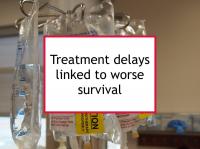Breast cancer treatment delays have been linked to worse outcomes. For example, time between lumpectomy and radiotherapy has been shown to be associated with local recurrence risk — the longer the delay, the higher the risk. Now a new study has reported that initial treatment taking more than 38 weeks to complete is linked to lesser survival.
The study referenced above focused on women who had breast cancer surgery followed by chemotherapy rather than neoadjuvant chemotherapy (designed to shrink the tumor before surgery).
Tumors of newly diagnosed women often have been growing for years before being detected. In the case of very indolent disease, tiny tumors could potentially remain untreated for extended periods of time without materially affecting prognosis.
However, once surgery occurs, it may be followed by accelerated growth of both local tumors and any distant micrometastases. In other words, the process of tumor removal appears to potentiate the resurgent growth of residual cancer tissue. Therefore, swift and appropriate treatment is important once breast cancer is confirmed by pathology after surgery.
Latest research finds delays can reduce survival
The current retrospective study was designed to examine the association between the length of time between diagnosis and completion of initial breast cancer treatment (i.e., surgery, chemotherapy, and radiotherapy) and survival. To conduct the study, the authors analyzed data in the National Cancer Database (NCDB) concerning stage I-III breast cancer cases diagnosed in 2010. A total of 28,284 patients received surgery, chemotherapy, and radiotherapy as their initial treatment and were included in the study. The cases were followed for a median of 5.8 years.
Based on their analysis, the authors identified a cut-off period of 38 weeks — treatment that was complete beyond 38 weeks was found to be associated with a 21% reduction in overall survival compared to treatment completed within 38 weeks. Analysis by breast cancer tumor receptor status showed that the delay-related reduction in survival held for all the major receptor subtypes: triple-negative (ER-/PR-/HER2-) (18.8% reduction in survival); ER+/PR+/HER2- (22%); ER-/PR-/HER2+ (29%); and ER+/PR+/HER2+ (32%). The authors conclude that improving the efficiency of breast cancer treatment and reducing treatment delays should be given priority in order to optimize breast cancer outcomes.
Please see the treatment delays tag for more information.
